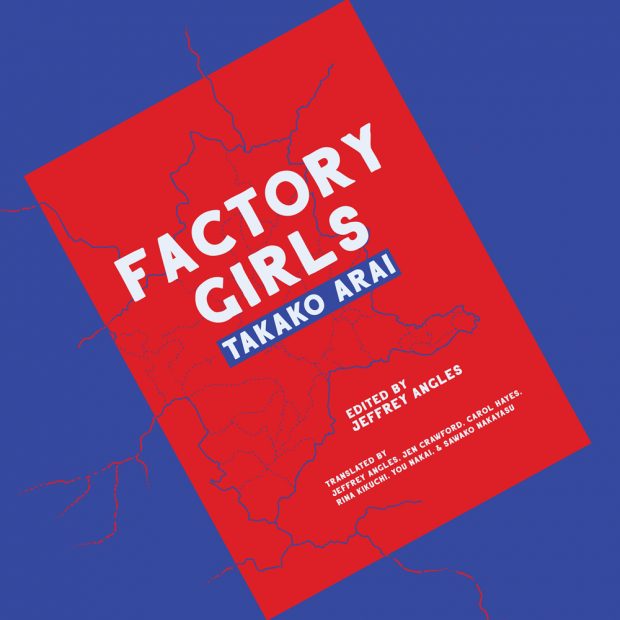USEREVIEW 001: Quaking, It’s Morning
K.B. Thors revels in the historic breadth and folkloric depth of Factory Girls (Action Books, Nov 2019), which is the third book of poetry by the award-winning Japanese author, editor and professor Takako Arai.
ISBN 978-0-900575-84-6 | 99pp |$18 USD
#CAROUSELreviews
It is the night shift in an abandoned spinning factory
There is only a single light bulb here
The spools of thread turn by themselves …
This is what happens “When the Moon Rises” — the opening poem in Takako Arai’s Factory Girls, an audacious ride from a cottage-style textile factory to today’s atomic capitalism. Blending surreal narrative with linguistic clips and plays, Arai probes the nuclear trauma and folk legends that underlie Japan’s 21st-century relationship with natural, man-made and hybrid disaster.
Industrial danger is immediate and inescapable in this collection edited by Jeffrey Angles and translated by a team consisting of Angles, Jen Crawford, Carol Hayes, Rina Kikuchi, You Nakai and Sawako Nakayasu. Appropriately, for a book that applies folklore to urbanization, the reader first encounters a human in the form of mythologized gossip:
They say that soon after the war
A factory worker’s hair got tangled
In the machines, killing her …
Throughout this volume, Arai’s no-nonsense descriptions of violent workings make the action more graphic — we wind up imagining and recoiling from events described. But there isn’t much time to recoil. The history in the poems presses on. Like factory workers and the economy, we are expected to continue without wasting production time.
Arai grew up in Kiryū, a region of Japan historically renowned for weaving. Her father managed a small factory on the family property, and Arai is known for her portrayals of the lives of the women workers there. The poems are presented in three sections, the first of which is called “In The Factory.” “When the Moon Rises” tells us about “an old lady who spun thread / for forty-four years here / still licks her index finger and twists / even on her deathbed / she cannot escape the gesture.” Generations of women have inherited an understanding of what factory work does to the body, how repeated movements become part of the worker performing them.
Machine oil, hair oil, and breast milk — those were the scents of the factory.
The poems are made through the intimate perspective Arai had of these workers’ lives. “Beds and Looms,” a long poem where the text picks up steam, is first-person: “My job as an operator was to call them out,” it begins. The narrator is a girl whose job is to race through the factory whenever one of the workers — who often came from afar for the work — received a phone call. The poem tells the story of Yai-chan, a highly-reputed weaver specifically requested to weave a robe for a Buddhist priest.
The gold-threaded brocade (four hundred thousand yen per meter)
Worn by the abbot of the high temple
Supported
The life of the factory
All twenty-two workers, their husband’s liquor
Their mother-in-law’s incense
Their sons’ excursions at school.
Such verses illuminate the roles and limited realities of these women by whom much of Japan’s modernization was built. We learn that Yai-chain had a baby that she gave up to a sister after the father’s rejection, and that she’s sleeping with the man who fixes the looms, perhaps for the chance to nap in a smuggled bed. Personal business is known among the sewing machines. Baby beds are common among the looms, where “the woman manager would always say / Those priests never know women / It’s not Buddhist recitations that let / Them reach Nirvana / It’s our woman weavers / It’s the robes against their skin.” Local religion, class and pride entwine in a tangle of tradition and feminism.
The second section of the book, “Into the World,” pushes out of the factory into twenty-first century landscapes. “Give Us Morning” opens:
Morning’s the time we count the dead
In the newspapers, in the hospitals, on the roads, on the seashores
In the rubble that was once our homes
The 2011 earthquake, tsunami and Fukushima nuclear catastrophe produced waves of dynamic grief, which Arai gives voice to while examining Japan’s underlying social concerns. “Galápagos” digs into “Galápagos syndrome,” a Japanese business term for the isolated development of products also manufactured abroad. Stemming from Darwin’s observations of island-specific adaptations, an example of “Galápagosization” is Japanese ATMs, whose design makes them largely unusable for foreigners.
Just gossip! The damn economy is
Nothing but a fairy tale!
Economic anxiety is exacerbated by domestic national issues. Uniqlo’s global reach is a commercial victory for Japan, but “Galápagos” links the brand’s generic, unisex aesthetic to Japan’s extremely low birthrate. Nuclear vernacular blurs into biology:
Just look
At that fission
They say they can’t get any fusion
Between those sperm-like neutrons
As Factory Girls marches toward modernity, Arai gets snappier. The kids — “those Microsoft monsters’” — aren’t interested in the birds and the bees. Besides, worries about radiation exposure have led to discriminatory tones in Japanese media as people from polluted areas are pressured against having reproductive sex.
No nuclear dome?
Then we’ll make electricity
In our con-domes
Is a half-life
Good enough
For us?
The Notes on the Translations included in the book mention that Arai has said that she wanted to show that the prioritization of economics not only resulted in the nuclear meltdown, but has also instilled in the population a compulsion to curtail personal freedom and joy. As organizations like the UN, WHO and WWF International tell us that pandemics result from the destruction of nature, Arai confronts the consequences of our failure to acknowledge or act upon what we know about our environmental reality. As of March 2020, experts were still trying to figure out what to do with the radioactive water around Fukushima.
History becomes ecology before looping back into human drama. The poem “Lots and Lots” examines how cultural material like Tezuka Osamu’s manga character “Iron-Armed Atom” — known in America as Astro Boy — desensitized Japan to nuclear fear in the years after World War II. Amid twists on classic Japanese poetry, Arai keeps an eye on gender by explaining that Osamu used the English word “Atom” in the manga because the final Japanese character in the word “atom” is found at the end of many contemporary girls’ names. Written entirely in Japanese, one might assume the robot female, a possibility less preferable than using not only a foreign tongue but English, the language of those who dropped the atomic bombs. A capitalist language.
In addition to shout-outs for Atom’s sister Uran (from Uranium) and his brother named Cobalt, Arai applies the name Atom to each of Japan’s fifty-four nuclear reactors.
Some of the other Atoms
Also stood atop fault lines
Some grew old, their metallic exhaustion began
And then
Even though we shut them down
We still couldn’t find a place to get rid of them
This is our one and only world
Not a manga in which we can blow things up in space
There he was
Mulling over the laws of robotics
“I was born to make people happy”
This pop culture influence is fascinating as it is chilling, and further exemplifies Arai’s wide-ranging references and language registers. Not being a reader of Japanese. I was grateful for the Notes on Translation, as well as the Editor’s Afterword, which explained Arai’s linguistic liberties and cultural references.
Amid scientific terms, the English often feels casual, intimate through shorthand diminutives like “tummy.” In the poem “Soul Dance,”Arai invents the words “Disaster-day” and “Drunk-day” using homonyms for the Japanese words meaning “Tuesday” and “Wednesday.” She also invents post-fallout mythical characters:
The creature crawled from the midnight mountain of rubble with its long, skinny tail
A tail that writhes
It is the bowels of the soul
Glowing fluorescent green
In its half-transparent head, the creature bares its buck teeth
These new animals are given voice:
I won’t eat the flesh of human necks, they’re too hard
People are no good at handling things
They just bow over and over like fools
I could soften them with vinegar …
As experts call for legislation that could give the planet a chance to recover, Arai turns to write “Of Gods and Small Animals.” In this final section, poems may measure in human terms, but their focus is on beings like “Caterpillar”:
Eating yuzu leaves non-stop and crapping mountains
The speckled green caterpillar
When one size larger than a woman’s pinky
Leaves the branch …
Arai’s circle back into nature peaks with the incantatory “For Amenouzume-San,” a crescendo that builds through a series of imperatives. Space between the phrases amplifies the beat of this hymn to Amenouzume, a Japanese goddess of dance and performance who is said to have drawn the Sun Goddess Amaterasu out of a cave she had holed up in, leaving the world dark. Arai’s word play leaps, winking at the reader by riffing on the sound and characters of Amenouzume’s name.
Open it, that rock cave, Amenouzume-san
Dance it, your breasts out, Ameno-Frolicking-Princess
Listen to it, distant thunder Ameno-Rabbit-Ears …
To read this long poem is to sing it, and to be tempted toward the idea that although humans are destructive and base, there is something redeeming in language and the intention to connect with elemental forces.
… Sprain it, by the ocean Ameno-Crouching-Woman
Rub it, the ninth month Ameno-Aching-Woman …
The tone is grand yet cheeky:
… Make them laugh the gods, Ah, Heaven’s-Unruly-Hair-Drunks
Good at it, stripping Ah, Heaven’s-Thinly-Robed-Princess
Take it, the side strings Ah, Heaven’s-Naked-Woman …
The appreciation of feminine labor reaches virtuosic heights when the dance is successful and the day returns:
Quaking, it’s morning Ah, Amenouzume-san
Shine it, it’s morning Ah, Amenouzume-san
Ah, Amenouzume-san
Amenouzume-san
We have seen what happens when the moon rises, the intimate, earthbound journeys that take place over night. Clever, ghastly and ecstatic, Arai boils down the truth: the sun begins again.


